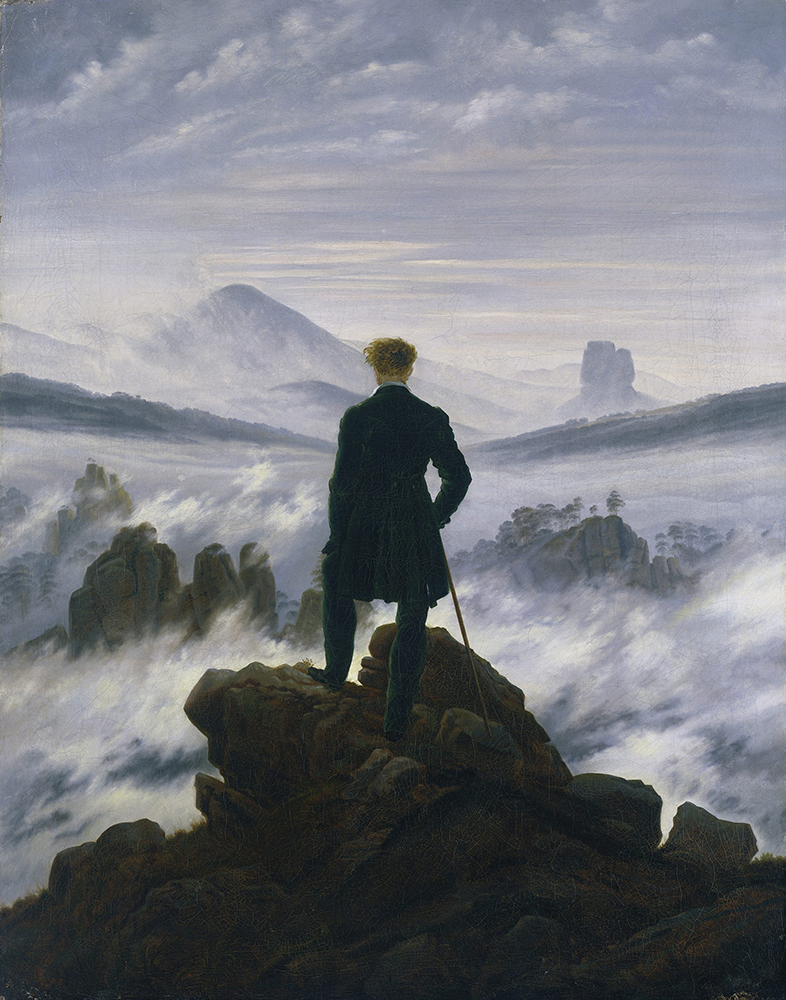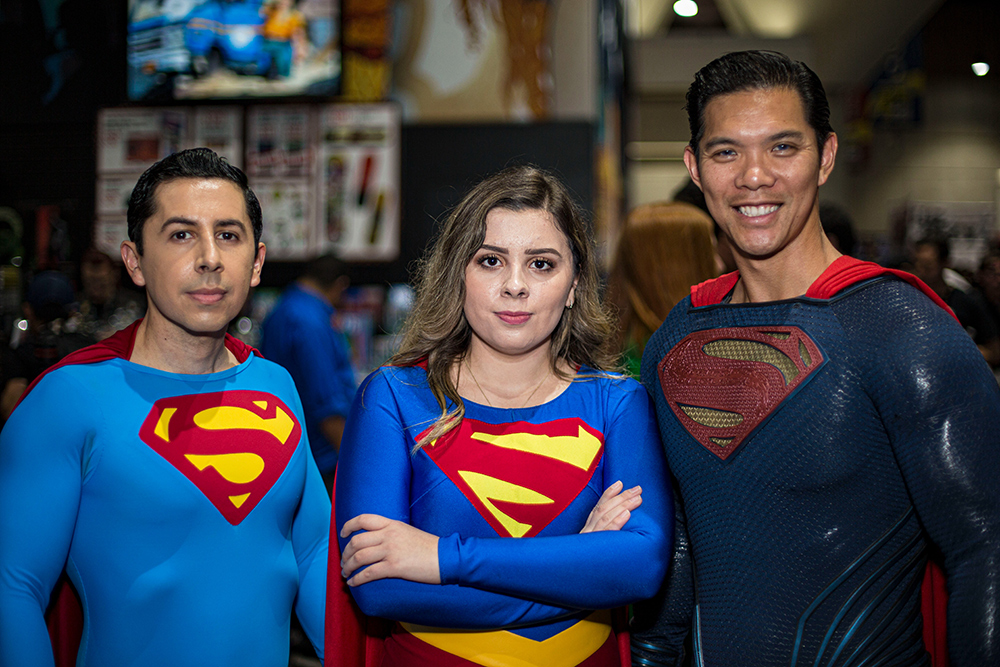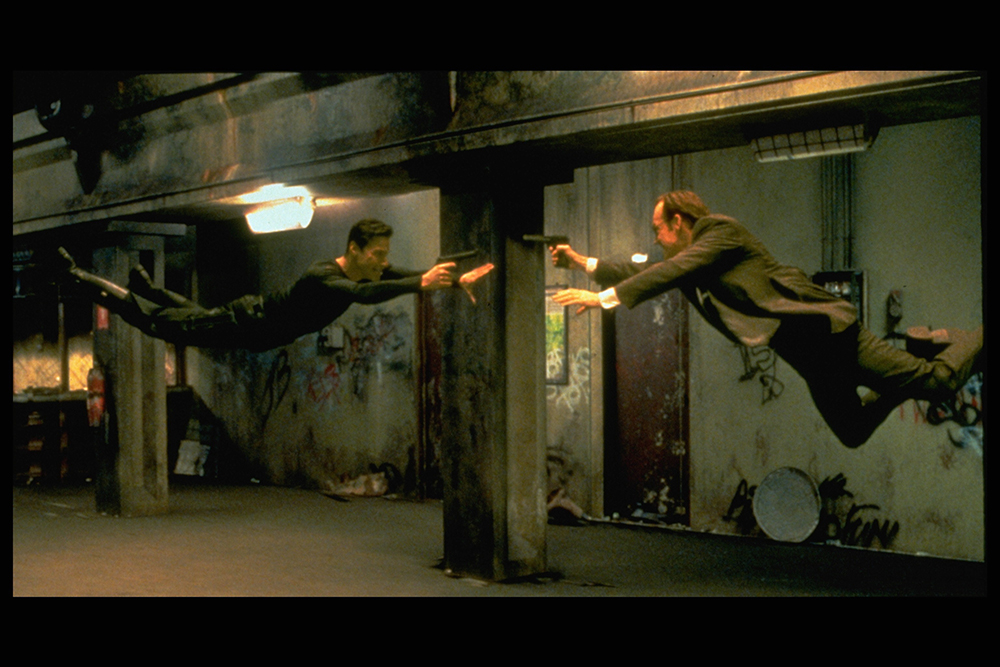
德國哲學家弗里德里希·尼采在其1883年出版的經典著作《查拉圖斯特拉如是說》(Thus Spoke Zarathustra)中寫道:“人是一種必將被超越的東西。”他還認為:“人是一根繩索,系于禽獸與超人之間,凌駕于深淵之上。人的偉大之處在于,他是一座橋梁,而不是終點。”
寫下這篇文章時,這位著名學者一方面受困于對德國文化的矛盾情緒(包括與他的朋友、作曲家理查德·瓦格納的分歧),另一方面也深受多種疾病及可能已經構成毒癮的鴉片嗜好之苦。但他同時也在努力認識歷史學家口中的“第二次工業革命”,即大規模生產革命。
尼采的許多著作雖然在他有生之年讓人覺得不知所云,卻精準預言了一個充滿他所謂“虛無主義”的20世紀,尤其是他那句著名的宣言“上帝已死”更是振聾發聵。取上帝而“代之”的是所謂“超人”(superman,德語übermensch),他們能夠主宰自己的命運、摒棄傳統基督教規范、創造自己的價值體系,從而戰勝人類面臨的一切挑戰。現在,我們迎來了人工智能時代,又有現代技術專家宣稱,“第四次工業革命”將催生新的“超人”,這不禁讓人產生疑問:人類是否仍是凌駕于深淵之上的繩索?
我們不妨回顧一下一路走來的歷程。
快過子彈
每當出現顛覆性技術時,尼采關于“超人”誕生的預言似乎都會再次走入公眾視野。在此舉兩個大家耳熟能詳的例子。
第一個例子,在尼采構想出“超人”概念約半個世紀后的1939年,《動作漫畫》(Action Comics)第一期面世發行,其中的漫畫人物“超人”(Superman)成為史上首位漫畫超級英雄。當時的世界正飛速進入原子時代——近期的熱門大片《奧本海默》(Oppenheimer)講述的就是這一時期的故事,社會享受著第二次工業革命的突破性成果帶來的發展紅利,遍布電梯、摩天大樓和汽車的現代化城市開始出現,而超人則代表一種能夠輕松征服現代科技的形象。超人的口頭禪是:“快過子彈!比火車頭更有力量!縱身一躍,直上高樓!”(甚至這句話本身也頗具工業色彩,出自1940年的一檔廣播節目,當時,廣播還是一種全新技術)。

尼采筆下的“超人”(übermensch)是一種對抗宗教、超越基督教會規范的存在,而漫畫中的超人(Superman)角色則致敬了一代代人類所取得的進步,擁有防彈皮膚、激光眼等超能力。
此外,尼采的“超人”是一個理想化的概念,只看字面就能讓人聯想到更超然的境界,而DC漫畫中的超人則是來自外星世界——氪星(一個比地球更高級的星球)。漫畫中的超人不僅身體素質優于常人,還保留了尼采筆下“超人”的某些特點,是道德和正義的象征。即使只看漫畫超人在日常生活中的身份——克拉克·肯特,作為一名理想主義的記者(顯然也是最道德正確的職業),他在道德上也同樣無懈可擊。
漫畫中的超人形象與資本主義者和技術主義者所信奉的“超人類主義”(transhumanism)概念相輔相成。這一概念認為,在先進技術的加持下,人類將能夠大幅增強自身能力、改善所處環境。這不禁讓人想起尼采將人視為“繩索”和“需要超越的東西”的觀點,或者超人類主義者“人是機械化基礎”的理念。超人類主義中有一個“新人”的概念,這是一種理想化的烏托邦式完美人類。在尼采死后幾十年,這一概念被共產主義、法西斯主義及其分支納粹主義等非民主運動所利用,每個運動都設想通過科學和技術創造完美的公民。即使是對20世紀歷史了解最少的學生也知道,上述嘗試造成了可怕的悲劇性結果。
對21世紀的數字原住民來說,這些概念可能顯得有些難以理解,但實際上,它們仍然深深扎根于主流政治和流行文化之中。世界首富埃隆·馬斯克本人就是一位眾所周知的超人類主義者,他正在積極推進太空殖民和腦機芯片項目。科幻小說也通過刻畫各種類型的超人和超級人類實現了蓬勃發展,此類角色通常以烏托邦方式出現,例如20世紀80年代的《銀翼殺手》(Blade Runner)和前些年的《黑客帝國》(The Matrix)。就連今年夏天的熱門電影《芭比》(Barbie)也有一些超人類主義色彩。影片中,這個冒險進入現實世界的塑料娃娃具有刻板印象中那種理想化的女性氣質和美貌,不過有影評認為,在現代生活中,女性根本無法成為女超人。

21世紀的超人有哪些特點?
由于“理想”人固有的階層特性,在我們看來,超人概念(尤其是在其與科技交織在一起時)已經成為一種常用的政治工具。雖然社會主義者和資本主義者都將超人類主義玩弄于股掌之間,但社會主義者對其進行了理論化,認為政治超人類主義或將催生出2.0版本的資本主義,一個科技驅動生產力實現飛躍的時代。
現在,第四次工業革命(智能自動化、互聯互通和人工智能革命)已經近在眼前,哲學愛好者們可能在想,我們這個時代的“超人”會以怎樣的形象出現在我們眼前?雖然現在下定論還為時尚早,但歷史表明,人們總會尋找一個能夠超越我們時代權力框架的理想化偶像。
全球頂級富豪孫正義提出,人工智能將成為我們這個時代的“超人” ,在他口中,這一發明的出現等同于“超級人類的誕生”。過去幾十年,孫正義一直是全球主要的風險投資人之一,也是日本軟銀集團(SoftBank)的首席執行官。今年,他向投資者宣布,由于ChatGPT的出現讓他對人工智能和生命意義產生了一種悲觀的生存危機,他已決定將公司和事業重心投向“設計人類未來”的工作之中。此番言論聽起來多少有點像尼采口中的虛無主義危機。
這當然不是說孫正義是下一個尼采,但他與尼采筆下的“超人”的相似之處顯而易見。孫正義告訴軟銀的股東們,他每天都在用人工智能提出和完善各種想法,并在不到一年的時間里利用這一工具開發了600多項新發明。從超人類主義者的角度來看,他顯然正在利用新興技術大大增強自己的智力和構思能力。當世界經歷另一場技術革命、人們尋找能夠超越我們這個時代權力框架的理想實體時,我們有必要先問一問,這個框架是什么?可以說,答案就是“信息”。
或許我們可以將人工智能與尼采筆下的“超人”與漫畫中的超人進行某種類比:尼采筆下的“超人”控制的是道德的制高點,在道德上白璧無瑕;漫畫中的“超人”掌控的是傲人的身體素質,刀槍不入,而人工智能擁有的則是儲存在上萬枚芯片上的淵博知識。不同的是,漫畫中的超人和尼采筆下的超人都是虛構人物,人們無法與他們進行真正的互動。他們只存在于理想的概念之中,而人工智能則是一種正在推動世界快速變化的真實工具。
至于人工智能將對勞動力隊伍帶來何種影響,現在下結論還為時尚早,但我們在看到各種超人概念時或許應該抱持謹慎態度。也許人類確實是凌駕于深淵之上的一根繩索,但借助技術追求超能力無疑是最有可能讓我們墜入深淵的路徑。(財富中文網)
譯者:梁宇
審校:夏林
德國哲學家弗里德里希·尼采在其1883年出版的經典著作《查拉圖斯特拉如是說》(Thus Spoke Zarathustra)中寫道:“人是一種必將被超越的東西。”他還認為:“人是一根繩索,系于禽獸與超人之間,凌駕于深淵之上。人的偉大之處在于,他是一座橋梁,而不是終點。”
寫下這篇文章時,這位著名學者一方面受困于對德國文化的矛盾情緒(包括與他的朋友、作曲家理查德·瓦格納的分歧),另一方面也深受多種疾病及可能已經構成毒癮的鴉片嗜好之苦。但他同時也在努力認識歷史學家口中的“第二次工業革命”,即大規模生產革命。
尼采的許多著作雖然在他有生之年讓人覺得不知所云,卻精準預言了一個充滿他所謂“虛無主義”的20世紀,尤其是他那句著名的宣言“上帝已死”更是振聾發聵。取上帝而“代之”的是所謂“超人”(superman,德語übermensch),他們能夠主宰自己的命運、摒棄傳統基督教規范、創造自己的價值體系,從而戰勝人類面臨的一切挑戰。現在,我們迎來了人工智能時代,又有現代技術專家宣稱,“第四次工業革命”將催生新的“超人”,這不禁讓人產生疑問:人類是否仍是凌駕于深淵之上的繩索?
我們不妨回顧一下一路走來的歷程。
快過子彈
每當出現顛覆性技術時,尼采關于“超人”誕生的預言似乎都會再次走入公眾視野。在此舉兩個大家耳熟能詳的例子。
第一個例子,在尼采構想出“超人”概念約半個世紀后的1939年,《動作漫畫》(Action Comics)第一期面世發行,其中的漫畫人物“超人”(Superman)成為史上首位漫畫超級英雄。當時的世界正飛速進入原子時代——近期的熱門大片《奧本海默》(Oppenheimer)講述的就是這一時期的故事,社會享受著第二次工業革命的突破性成果帶來的發展紅利,遍布電梯、摩天大樓和汽車的現代化城市開始出現,而超人則代表一種能夠輕松征服現代科技的形象。超人的口頭禪是:“快過子彈!比火車頭更有力量!縱身一躍,直上高樓!”(甚至這句話本身也頗具工業色彩,出自1940年的一檔廣播節目,當時,廣播還是一種全新技術)。
尼采筆下的“超人”(übermensch)是一種對抗宗教、超越基督教會規范的存在,而漫畫中的超人(Superman)角色則致敬了一代代人類所取得的進步,擁有防彈皮膚、激光眼等超能力。
此外,尼采的“超人”是一個理想化的概念,只看字面就能讓人聯想到更超然的境界,而DC漫畫中的超人則是來自外星世界——氪星(一個比地球更高級的星球)。漫畫中的超人不僅身體素質優于常人,還保留了尼采筆下“超人”的某些特點,是道德和正義的象征。即使只看漫畫超人在日常生活中的身份——克拉克·肯特,作為一名理想主義的記者(顯然也是最道德正確的職業),他在道德上也同樣無懈可擊。
漫畫中的超人形象與資本主義者和技術主義者所信奉的“超人類主義”(transhumanism)概念相輔相成。這一概念認為,在先進技術的加持下,人類將能夠大幅增強自身能力、改善所處環境。這不禁讓人想起尼采將人視為“繩索”和“需要超越的東西”的觀點,或者超人類主義者“人是機械化基礎”的理念。超人類主義中有一個“新人”的概念,這是一種理想化的烏托邦式完美人類。在尼采死后幾十年,這一概念被共產主義、法西斯主義及其分支納粹主義等非民主運動所利用,每個運動都設想通過科學和技術創造完美的公民。即使是對20世紀歷史了解最少的學生也知道,上述嘗試造成了可怕的悲劇性結果。
對21世紀的數字原住民來說,這些概念可能顯得有些難以理解,但實際上,它們仍然深深扎根于主流政治和流行文化之中。世界首富埃隆·馬斯克本人就是一位眾所周知的超人類主義者,他正在積極推進太空殖民和腦機芯片項目。科幻小說也通過刻畫各種類型的超人和超級人類實現了蓬勃發展,此類角色通常以烏托邦方式出現,例如20世紀80年代的《銀翼殺手》(Blade Runner)和前些年的《黑客帝國》(The Matrix)。就連今年夏天的熱門電影《芭比》(Barbie)也有一些超人類主義色彩。影片中,這個冒險進入現實世界的塑料娃娃具有刻板印象中那種理想化的女性氣質和美貌,不過有影評認為,在現代生活中,女性根本無法成為女超人。
21世紀的超人有哪些特點?
由于“理想”人固有的階層特性,在我們看來,超人概念(尤其是在其與科技交織在一起時)已經成為一種常用的政治工具。雖然社會主義者和資本主義者都將超人類主義玩弄于股掌之間,但社會主義者對其進行了理論化,認為政治超人類主義或將催生出2.0版本的資本主義,一個科技驅動生產力實現飛躍的時代。
現在,第四次工業革命(智能自動化、互聯互通和人工智能革命)已經近在眼前,哲學愛好者們可能在想,我們這個時代的“超人”會以怎樣的形象出現在我們眼前?雖然現在下定論還為時尚早,但歷史表明,人們總會尋找一個能夠超越我們時代權力框架的理想化偶像。
全球頂級富豪孫正義提出,人工智能將成為我們這個時代的“超人” ,在他口中,這一發明的出現等同于“超級人類的誕生”。過去幾十年,孫正義一直是全球主要的風險投資人之一,也是日本軟銀集團(SoftBank)的首席執行官。今年,他向投資者宣布,由于ChatGPT的出現讓他對人工智能和生命意義產生了一種悲觀的生存危機,他已決定將公司和事業重心投向“設計人類未來”的工作之中。此番言論聽起來多少有點像尼采口中的虛無主義危機。
這當然不是說孫正義是下一個尼采,但他與尼采筆下的“超人”的相似之處顯而易見。孫正義告訴軟銀的股東們,他每天都在用人工智能提出和完善各種想法,并在不到一年的時間里利用這一工具開發了600多項新發明。從超人類主義者的角度來看,他顯然正在利用新興技術大大增強自己的智力和構思能力。當世界經歷另一場技術革命、人們尋找能夠超越我們這個時代權力框架的理想實體時,我們有必要先問一問,這個框架是什么?可以說,答案就是“信息”。
或許我們可以將人工智能與尼采筆下的“超人”與漫畫中的超人進行某種類比:尼采筆下的“超人”控制的是道德的制高點,在道德上白璧無瑕;漫畫中的“超人”掌控的是傲人的身體素質,刀槍不入,而人工智能擁有的則是儲存在上萬枚芯片上的淵博知識。不同的是,漫畫中的超人和尼采筆下的超人都是虛構人物,人們無法與他們進行真正的互動。他們只存在于理想的概念之中,而人工智能則是一種正在推動世界快速變化的真實工具。
至于人工智能將對勞動力隊伍帶來何種影響,現在下結論還為時尚早,但我們在看到各種超人概念時或許應該抱持謹慎態度。也許人類確實是凌駕于深淵之上的一根繩索,但借助技術追求超能力無疑是最有可能讓我們墜入深淵的路徑。(財富中文網)
譯者:梁宇
審校:夏林
“Man is something that shall be overcome,” the German philosopher Friedrich Nietzsche wrote in his 1883 classic Thus Spoke Zarathustra. “Man is a rope, tied between beast and superman—a rope over an abyss. What is great in man is that he is a bridge and not an end.”
When he wrote this, the famously troubled intellectual was reckoning with ambivalent feelings about German culture (including a fallout with his friend, the composer Richard Wagner), a series of illnesses, and an opium habit that very likely constituted a drug addiction. But he was also grappling with what historians call the Second Industrial Revolution, that is, the revolution of mass production.
Much of Nietzsche’s writings, obscure in his own lifetime, foreshadowed a 20th century full of what he called “nihilism,” especially his famous proclamation, “God is dead.” In his place was the superman, or “übermensch,” a determiner of his own life, who eschews traditional Christian mores and births his own system of values that allows him to conquer all human challenges. Now artificial intelligence is here, and modern technologists are proclaiming a “Fourth Industrial Revolution” that will give birth to a new “superhuman,” which begs the question, is humanity still the proverbial rope over the abyss?
It’s worth a look back at how we got here.
Faster than a speeding bullet
During times of technological upheaval, it seems that Nietszche’s prophecy of the birth of the übermensch always reemerges. There are two famous examples—you already know them.
First, about a half-century after Nietzsche conceived his version, Action Comics released its first issue in 1939, featuring a character named “Superman” who went on to become the very first comic-book superhero just as the world was hurtling into the atomic age, recently depicted in the blockbuster smash hit, “Oppenheimer.” As society digested the breakthroughs of the Second Industrial Revolution, creating modern cities full of elevators, skyscrapers and cars, Superman represented a figure who could easily conquer modern technology. It was all there in the catch phrase: “Faster than a speeding bullet! More powerful than a locomotive! Able to leap tall buildings in a single bound!” (Even this phrase itself was industrial in nature, originating in a 1940 show for the radio, an entirely new technology.)
While Nietzsche’s übermensch was an embodiment of religious rejection, a being who transcended the mores of the Christian church, the character of Superman nodded to generations of human advancement, with abilities including bulletproof skin and laser-beaming eyes.
Moreover, Nietzsche’s übermensch was an aspirational concept whose name literally evokes a higher plane, and DC’s Superman is from the alien world of Krypton, a planet more sophisticated than Earth. Not only is Superman physically superior to the normal man, but he retains aspects of the original übermensch as a pillar of moral uprightness. Even in his alter ego as Clark Kent, he is morally infallible as an idealistic journalist (the most morally correct profession, of course).
The superman goes hand-in-hand with the concept of transhumanism embraced by capitalists and technologists—the idea that advanced technology will allow humans to transformatively augment themselves and their environment. It harkens back to Nietzsche’s vision of man as a “rope” and “something to be overcome,” or in the transhumanist view, a base for mechanization. Within transhumanism is the concept of the “new man,” a utopian ideal of the perfect person, a concept coopted decades after Nietzsche’s death by non-Democratic movements ranging from Communism to Fascism to its subset, Nazism, each of which envisioned the perfect citizen created through science and tech. Even the most casual student of 20th century history knows this went tragically and horrifically wrong.
While these concepts seem bizarre to a 21st century digital native, they’re actually still heavily embedded into mainstream politics and pop culture. The world’s richest man himself, Elon Musk, is a known transhumanist who is actively working on projects to colonize space and insert computer chips into our brains. Science fiction has flourished by examining variations on the superman and the transhuman, often in dystopian ways, for example with Blade Runner in the 1980s and The Matrix more recently. Even this summer’s smash hit Barbie movie dabbles in transhumanism, as a plastic doll blessed with the stereotypical ideal of femininity and beauty ventures into the real world, although several readings of that film land with the takeaway that there’s just no way to be a Superwoman in modern life.
Whatever happened to the Superman of the 21st century?
We see the superman concept, especially as it intersects with technology, as a frequently used political tool because of the inherent stratification an “ideal” person erects. And although transhumanism is toyed with by socialists and capitalists alike, sociologists have theorized that political transhumanism could birth Capitalism 2.0, an era hyperfixated on tech-driven productivity leaps.
Now, as we are rounding the bend on the Fourth Industrial Revolution—the revolution of smart automation, interconnectivity, and artificial intelligence—philosophy buffs may be wondering what will emerge as the übermensch of our time. While it’s early, to be sure, history hints that people will search for an aspirational icon that can transcend the power frameworks of our time.
One person has already posited a theory that our übermensch will be A.I.: Masayoshi Son, one of the world’s richest men, has already labeled the invention as the “Birth of Superhuman.” Son, who has been a major venture capital investor for decades and is the CEO of Japan’s SoftBank, announced to investors this year that the emergence of ChatGPT brought him to a tearful existential crisis over A.I. and the meaning of life, before deciding to dedicate his company and career to “design[ing] the future of humanity.” Sounds slightly tangential to Nietzsche’s crisis on nihilism.
This surely isn’t to say that Son is the next Nietzsche—but the resemblance to the übermensch is unmistakable. Son told SoftBank shareholders that he pitches and refines ideas with A.I. every day, and had used the tool to develop over 600 new inventions in less than a year. Through a transhumanist lens, he’s using emerging technology to hugely augment his intelligence and ideation abilities. As the world goes through another technological upheaval, and people look for an aspirational entity that can transcend the power framework of our time, it’s important to ask what that framework is. Arguably, it’s information.
In the way that Nietzche’s übermensch controlled his own infallible set of morals, or comic books’ Superman controlled his invulnerable body, perhaps the parallel can be drawn of A.I. controlling its vast, 10,000 chip-cache of knowledge. The difference is that the übermensch and Superman existed as fictional characters, without any real way for people to interact with them. They were aspirational, while A.I. is a real tool that’s driving rapid change in the world.
It’s too early to say how A.I. will transform the workforce, but we should probably take any notion of a superhuman with a grain of salt. Maybe humanity is a rope over an abyss, but the surest way to fall into it is through the pursuit of superpowers through technology.






